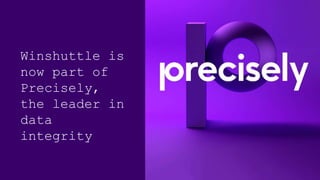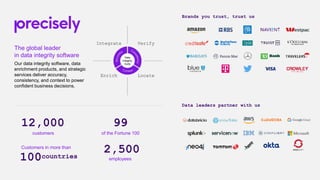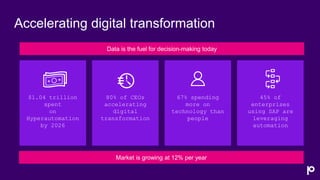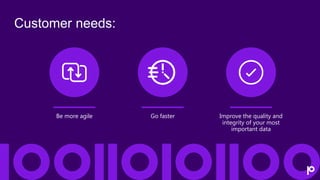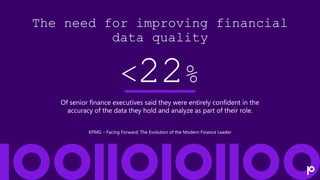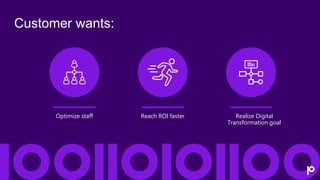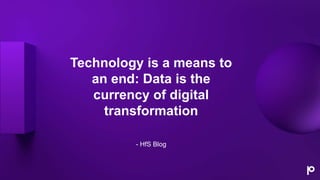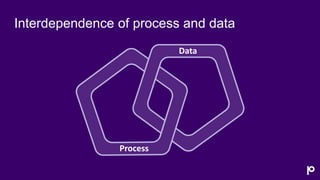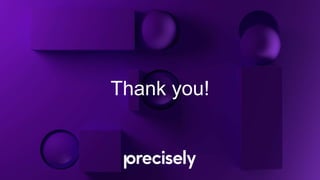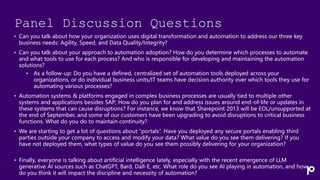Leveraging automation to meet today’s key business needs: agility, speed and data integrity
- 1. Leveraging automation to meet today’s key business needs: agility, speed and data integrity Andrew Hayden | Precisely
- 2. Winshuttle is now part of Precisely, the leader in data integrity
- 3. The global leader in data integrity software Our data integrity software, data enrichment products, and strategic services deliver accuracy, consistency, and context to power confident business decisions. Brands you trust, trust us Data leaders partner with us of the Fortune 100 99 Customers in more than 100 2,500 employees customers 12,000 countries Integrate Enrich Locate Verify Data Integrity Suite
- 4. Accelerating digital transformation Data is the fuel for decision-making today $1.04 trillion spent on Hyperautomation by 2026 80% of CEOs accelerating digital transformation 45% of enterprises using SAP are leveraging automation 67% spending more on technology than people Market is growing at 12% per year
- 5. Be more agile Customer needs: Go faster Improve the quality and integrity of your most important data
- 6. The need for improving financial data quality <22% Of senior finance executives said they were entirely confident in the accuracy of the data they hold and analyze as part of their role. KPMG – Facing Forward: The Evolution of the Modern Finance Leader
- 7. Optimize staff Customer wants: Reach ROI faster Realize Digital Transformation goal
- 8. Technology is a means to an end: Data is the currency of digital transformation - HfS Blog
- 9. Data Process Interdependence of process and data Interdependence of process and data
- 10. Questions?
- 11. Let’s continue the conversation… Contact us Set up a 30-minute personalized demo +1-877-700-0970 “Get in touch” on www.precisely.com www.precisely.com Demos White Papers Case Studies
- 12. Register now! precisely.com/automate2023 VIRTUAL EVENT September 26 Automate 2023
- 13. Thank you!
- 14. Panel Discussion Questions • Can you talk about how your organization uses digital transformation and automation to address our three key business needs: Agility, Speed, and Data Quality/Integrity? • Can you talk about your approach to automation adoption? How do you determine which processes to automate and what tools to use for each process? And who is responsible for developing and maintaining the automation solutions? • As a follow-up: Do you have a defined, centralized set of automation tools deployed across your organizations, or do individual business units/IT teams have decision authority over which tools they use for automating various processes? • Automation systems & platforms engaged in complex business processes are usually tied to multiple other systems and applications besides SAP; How do you plan for and address issues around end-of-life or updates in these systems that can cause disruptions? For instance, we know that Sharepoint 2013 will be EOL/unsupported at the end of September, and some of our customers have been upgrading to avoid disruptions to critical business functions. What do you do to maintain continuity? • We are starting to get a lot of questions about “portals”. Have you deployed any secure portals enabling third parties outside your company to access and modify your data? What value do you see them delivering? If you have not deployed them, what types of value do you see them possibly delivering for your organization? • Finally, everyone is talking about artificial intelligence lately, especially with the recent emergence of LLM generative AI sources such as ChatGPT, Bard, Dall-E, etc. What role do you see AI playing in automation, and how do you think it will impact the discipline and necessity of automation?
Editor's Notes
- #2: Alternative Headlines: - Alternative Sub-Headlines: Hyperautomation for your digital transformation dreams Driving digital transformation success
- #5: Gartner – And growing at 12% CAGR KPMG KPMG ASUG Gartner
- #6: Talk track: Coming out of the pandemic, many of the critical needs our companies have are the same as they were before the pandemic, but now there is a more urgent need to address them before we are faced with another sudden, existential disruption. Talking with our customers we believe the three core needs that companies have, which can be addressed by automation are: 1.) The need to be more agile, with the ability to pivot and adapt when our businesses or markets are disrupted. 2.) We continue to need to go faster to meet competitive threats and keep up with the ever-accelerating changes we see in the marketplace 3.) We need to do these first two while improving the quality and integrity of our most important data – our master data. Since data has become the fuel we use to make critical business decisions, we need to make sure that it is of the highest quality and that we can rely on it.
- #7: [For Senior-level accounting and finance audiences. Also automation teams with data quality initiatives] Since the General Ledger is often considered the single source of truth for SAP Financial operations, it’s imperative that the data be as accurate as possible. Unfortunately, the reality is that general ledger data often includes numerous errors that make accurate reporting and forecasting a challenge. According to a recent KPMG study of senior finance executives, fewer than 22% of them are entirely confident in the accuracy of the data they use for reporting, forecasting and analysis. Audience: BDM, SAP Analyst, Data Steward
- #8: Talk track In addition to the critical needs our businesses have, we also want to achieve a number of objectives that will help us remain competitive, these include: 1.) The desire to optimize our staffs – We have spent the better part of the past two decades right sizing, down sizing, and scaling our organizations to be as efficient as possible for today’s business conditions. The problem is that the market keeps evolving, and we gather more business-critical data every day. We want to find ways to help make the staff we have today more efficient and effective. 2.) We want to reach ROI faster. One of the early struggles with automation has been that it can be difficult to measure, or has a return on investment horizon that is too long to justify the up-front cost.
- #9: This quote does a great job of summing up the importance of data in executing digital transformation. It sets up our discussion for the interdependence of process and data and sets Precisely apart from many of the other process automation providers.
- #11: Seed Questions
- #12: SHARE THIS SLIDE at the end after there are no longer any more questions. Here is how you can reach me. Sean, how can they reach you?
- #16: What are we going to talk about today…
- #17: Why is automation such a hot topic in the IT world these days? The pandemic showed many of the shortcomings of our decades of digital transformation efforts. We have spent years and countless dollars digitizing our data and processes, but when the pandemic hot, many of us were caught flatfooted by it’s limitations. As a result, we are now seeing that for many of us, the next step on our digital transformation journey is automating our critical business processes. Many of these are centered on SAP ERP systems and involve creating and managing master data. Now, let’s look at the needs and wants that companies have coming out of the pandemic and how they can be addressed through automation.


